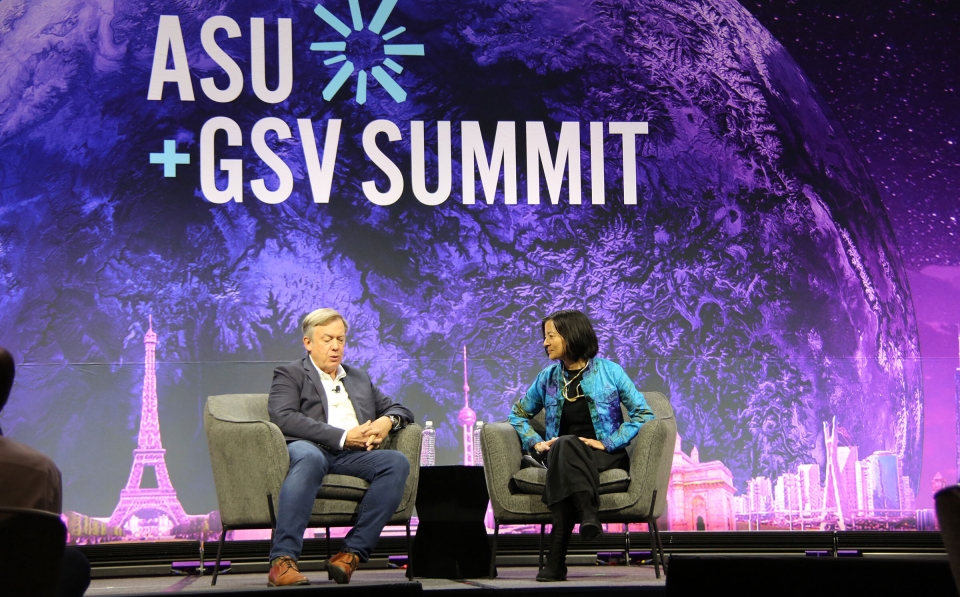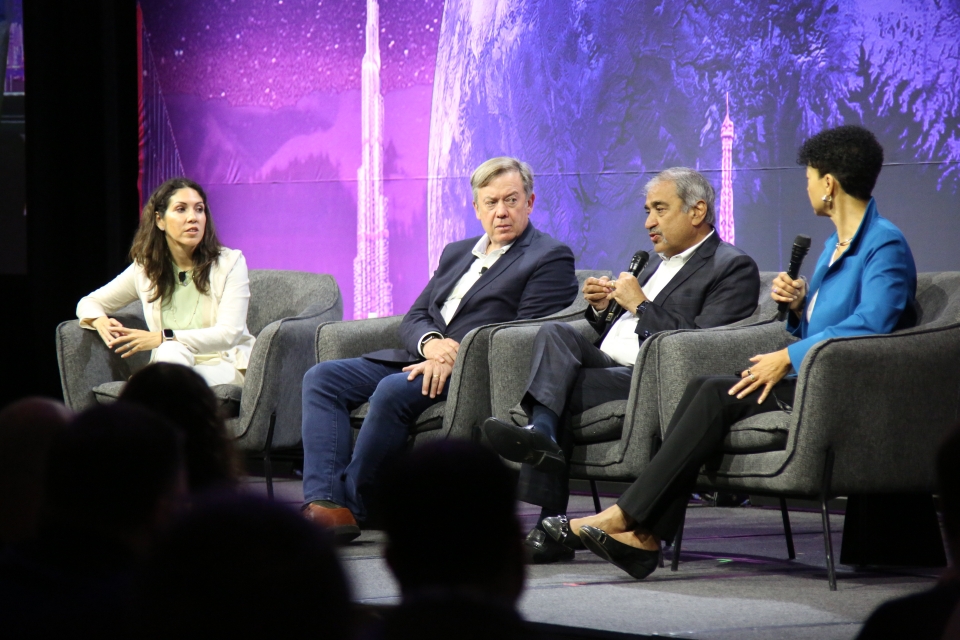ASU+GSV summit looks toward a 'brave new world' in education
Editor's note: We'll be updating this story daily throughout the summit.
This year's ASU+GSV Summit, held in San Diego this week, is exploring the theme, “Brave New World: Imagining a new era in which all people have equal access to the future.”
The education-technology conference drew more than 7,100 in-person attendees and an additional 10,000 watching the panels live streamed. About 350 higher education institutions are represented, including 22 speakers and 12 deans from Arizona State University.
Here are some panel highlights:
Monday, April 17
Designing Scalable Education Systems for Africa: Lessons From ASU and the Mastercard Foundation
ASU’s partnership with the Mastercard Foundation is helping to advance education in Africa, a continent bursting with economic opportunity.
ASU President Michael Crow kicked off the ASU+GSV Summit on Monday morning with a conversation with Reeta Roy, president and CEO of the Mastercard Foundation, which focuses on two goals in Africa: improving financial services for poor people and preparing young people for the workforce through education and upskilling.

ASU President Michael Crow and Reeta Roy, president and CEO of the Mastercard Foundation, talk about the Mastercard Young Scholars program at the ASU+GSV Summit on April 17.
Of Africa’s 1 billion people, 60% are under the age of 25, Roy said. About 40% have completed high school, and about 9% have some higher education.
“We all know education is part of nation building. It’s where leaders come from. It’s about economic competitiveness as well as social inclusion,” she said.
Roy said that technology innovation is necessary.
“When you look at the gaps, we can’t build enough schools or train enough teachers or professors. Technology is the force multiplier, enabling access and quality and allowing for relevance,” she said. “ASU has been an innovator when it comes to technology and education.”
Crow noted that dozens of young Africans have come to ASU as part of the Mastercard Young Scholars program, and he listened to one of them speak a few years ago.
“It was one of the most emotional moments I’ve had, listening to this student articulate her plan for the future of Arizona and her country, Zimbabwe, with her talent and her energy,” he said.
Two years ago, Roy moved to Rwanda when the foundation moved its headquarters there. She said the true story of Africa is different from the bleak headlines.
“Some of it is true, but there’s a bigger story under that,” she said. “I see young people creating companies and running for office and continuing their leadership for the city or organization they’re a part of.
“One of my wishes is for more organizations like ASU with whom we could partner, who enter a partnership with the right level of trust building, respect and listening.”
Following the Mastercard Foundation session, Crow then joined Pradeep Khosla, chancellor at the University of California San Diego, and Shellye Archambeau, board director at Verizon, for a panel on "Universities in the New Economy." The panel was moderated Maria Anguiano, executive vice president of Learning Enterprise at ASU.
The panelists discussed how universities are powering industries of the future through research, development and innovation, while partnering with leading enterprises to connect education and training with workforce needs. National-scale research universities in the U.S. have a responsibility for the health of the communities they serve, according to the panelists.

From left: Moderator Maria Anguiano and panelists Michael Crow, Pradeep Khosla and Shellye Archambeau during the session on "Universities in the New Economy."
Other ASU sessions for the day included:
Moving “or” Toward “and”: Breaking Down the False Dichotomy of College or Career
A recent study showed that 56% of Gen Z teens believe a skills-based education makes sense in today’s world. Yet, completing a college degree still remains one of the best predictors of socioeconomic mobility. Maria Anguiano, executive vice president of ASU Learning Enterprise, was joined by Lisa Gevelber, founder of Grow with Google and chief marketing officer of Google — Americas, and Shavar Jeffries, chief executive officer of the KIPP Foundation, to discuss how to move toward a “both/and” structure where people can earn career credentials and simultaneously earn a college degree. The panel was moderated by Ann Kirschner, a senior advisor to ASU President Michael Crow.
Transforming California Schools: A Conversation With State Superintendent Tony Thurmond
Christian Osmeña, vice president of enterprise planning at ASU, spoke with Tony Thurmond, state superintendent of public instruction in California, on how technology can advance progress for the state’s students.
The CHIPS Science Act: Exploring Our Nation's STEM Needs
Sally Morton, executive vice president of ASU Knowledge Enterprise, joined fellow panelists Paula Golden, president of Broadcom Foundation; Robert Simmons, head of social impact and STEM programs at MICRON Foundation; and Jan Morrison, founder and CEO of TIES for a discussion on the need for increased funding for STEM education and research, the importance of diversity and inclusion in the STEM workforce, and the role of industry-academia partnerships in addressing the nation's STEM needs. Panelists also delved into the CHIPS Science Act, legislation that addresses these issues and promotes the growth and competitiveness of the STEM workforce in the United States. The panel was moderated by Ann Kirschner, a senior advisor to ASU President Michael Crow.
Innovating to Address California’s Education Needs
Alan Arkatov, professor of practice and executive director of the ASU Institute for Education Transformation, was joined by leaders of higher education policy in California to discuss college enrollment declines, barriers to access and uneven outcomes in the state. Panelists were presented with the question: How can innovation transform outcomes for Californians?
Photos courtesy EdPlus at Arizona State University